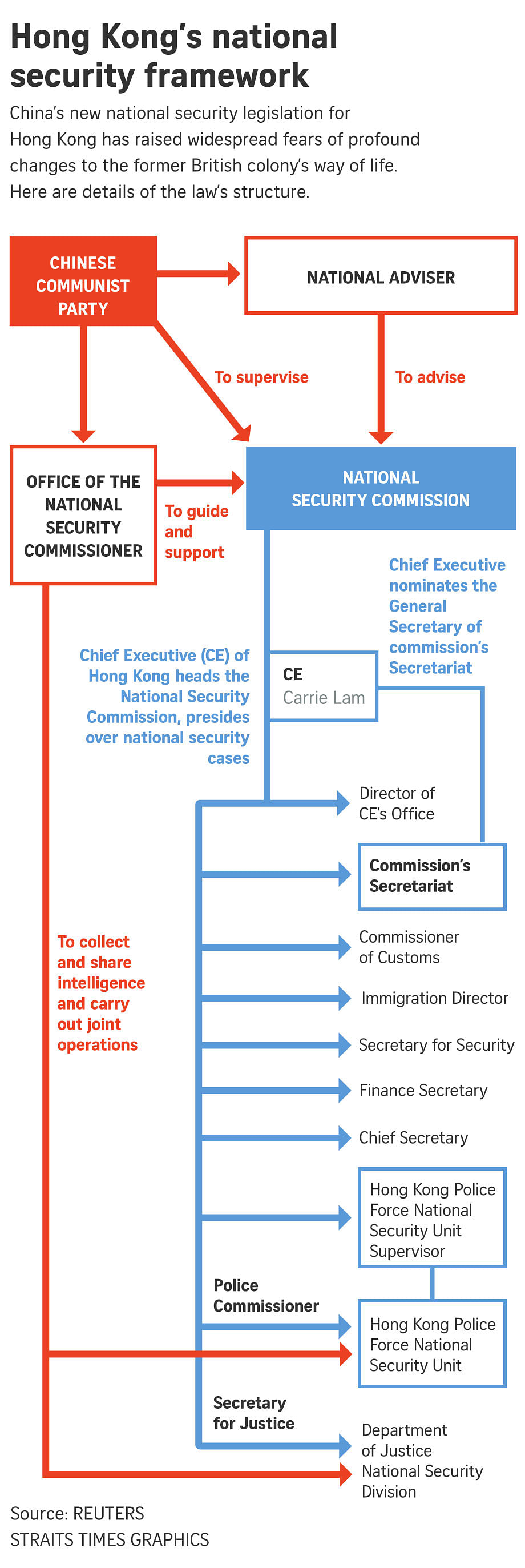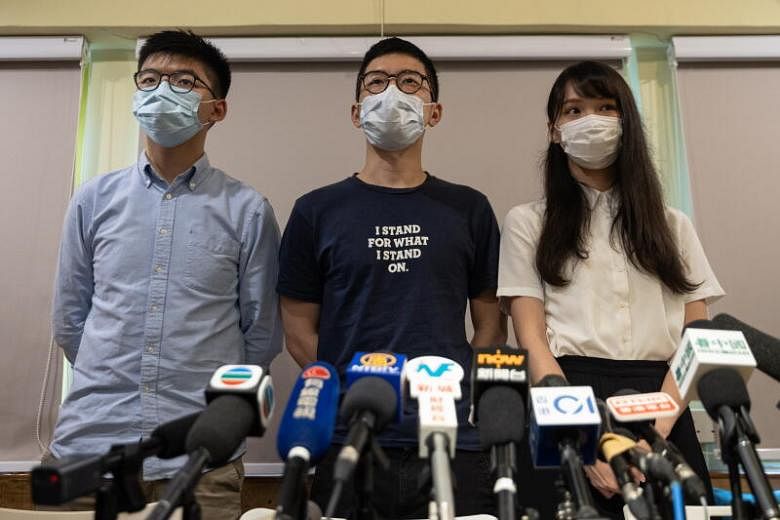HONG KONG - A wave of Hong Kong activists and supporters of an anti-government movement have swiftly made their exits or disbanded their groups after China's Parliament approved new national security law that many feel will erode the territory's freedoms and clampdown on dissent.
The law, which was drafted in a matter of weeks and bypasses Hong Kong's Legislative Assembly, bans subversion and secession, among other things.
It was drafted in response to months of often violent pro-democracy protests in Hong Kong last year.
China's top lawmaking body on Tuesday (June 30) passed the Hong Kong national security law, a senior adviser to Beijing on Hong Kong, told The Straits Times.
Demosisto's former secretary-general, Joshua Wong, and two co-founders, Nathan Law and Agnes Chow, announced their decision to leave the group in separate social media posts on Tuesday.
Without going into details, Wong said in a Facebook post he has resigned and would leave Demosisto.
"The will of Hong Kong will not be frozen by the national security law or any evil law," he said, adding that he will "continue to stay in my home, Hong Kong, until they silence me".
The party later announced in a separate Facebook post that it is difficult to operate in the current climate and urged its former members and others to fight for Hong Kong in their personal capacity.
A majority in Hong Kong opposes the legislation, a poll conducted for Reuters this month showed.
In May last year, United States House of Representatives Speaker Nancy Pelosi and US Secretary of State Mike Pompeo met several opposition figures, including Senior Counsel Martin Lee, activists Lee Cheuk Yan and Demosisto's Law.

In July, US Vice-President Mike Pence and Mr Pompeo held meetings with media tycoon Jimmy Lai to discuss Hong Kong's amendments to the now-scrapped extradition Bill.
In September, the US Congressional-Executive Commission on China held a Hong Kong-related hearing and invited Wong and fellow protest supporter and singer Denise Ho to testify.
Wong, among the prominent faces in the city advocating democracy and universal suffrage, is facing charges relating to a June protest. His case is to be heard in early July.
On Tuesday, localist group Hong Kong National Front announced in a Facebook post that it has disbanded its Hong Kong operations, with the exception of its overseas arms in Taiwan and Britain.
The party supports Hong Kong independence and its spokesman is former lawmaker Baggio Leung who was convicted for storming a Legislative Council (Legco) meeting.
"That said, this does not mean we will stop. Our work here will be taken over by the overseas branch and we will fight for Hong Kong's independence from overseas," the party wrote.
Meantime, the Civil Human Rights Front said late on Tuesday that its appeal against the ban on the annual July 1 march has been dismissed.
"With the announcement of the national security law, there are now doubts about the Front's existence. If we are still around, we will announce further action next week."
A top adviser to Hong Kong Chief Executive Carrie Lam said the security law would not be used if the financial hub's residents avoid crossing certain "red lines".
"It really is to warn people: Do not cross those red lines, you cannot ask for Hong Kong independence and we do not tolerate terrorist acts like what happened last year during the social unrest," Mr Bernard Chan, a convener of Hong Kong's advisory Executive Council, said in an interview with Bloomberg Television on Monday.
To encourage compliance, former chief executive Leung Chun Ying on Tuesday said a fund is offering bounties of up to HK$1 million (S$180,000) to people who report offenders of the new law or provide information on "anyone who has fled the city".
The 803 Fund is linked to a website set up last year by Mr Leung, a vice-chairman of the Chinese People's Political Consultative Conference.
It offers rewards to those who provide information that leads to the arrest and prosecution of anti-government protesters.











